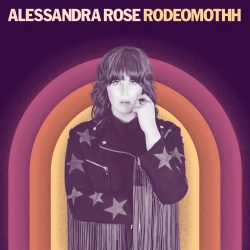Alessandra Rose’s sophomore outing ‘Rodeomothh’ is a marriage made in heaven – or, at least in Nashville.
 The vocals on this record combine with the lyrics to create an album that plumbs extraordinary emotional depths. It is confessional but transcends the purely personal to reach anyone who has ridden the relational rollercoaster. Rodeomothh is a reminder of why lyrics means something quite different from words. Lyrics need to be sung to be understood. Alessandra Rose’s lyrics don’t always make sense when read as mere words on a page, but her delivery gives them meaning and definition, lengthening the peaks and troughs of joy and pain, sharpening the sense of loss and exhilaration.
The vocals on this record combine with the lyrics to create an album that plumbs extraordinary emotional depths. It is confessional but transcends the purely personal to reach anyone who has ridden the relational rollercoaster. Rodeomothh is a reminder of why lyrics means something quite different from words. Lyrics need to be sung to be understood. Alessandra Rose’s lyrics don’t always make sense when read as mere words on a page, but her delivery gives them meaning and definition, lengthening the peaks and troughs of joy and pain, sharpening the sense of loss and exhilaration.
Rose went to Nashville to record Rodeomothh. At Sputnik Sound studio she assembled a great team of technicians, including Grammy-winning producer/engineer Mitch Dane (The Blind Boys of Alabama) and engineer Vance Powell Powell (Chris Stapleton, Jack White). Courtlan Clement is on guitar, Kevin Whitsett on bass, drummer Paul Eckberg, and Charlie Lowell on piano and synth join Rose’s acoustic guitar and together they’ve created music that merges well with her vocals. This isn’t just a backing band.
The singer’s rock roots come through the album. Having started as a singer for the Seattle rock band The Kindness Kind, Rose comes out of America’s West Coast rock scene. On ‘Rodeomothh’, the drums and bass play a central role, like in many a great rock song, and the guitar work is at times anthemic. But this isn’t simply a rock album There are sounds of country, jazz and blues and even echoes of Ennio Morricone’s Italian cowboy music. This is great music and complex orchestration that matches the emotion of each song.
While the sound is important, it is Rose’s voice and lyrics that give the album its energy and emotion. She has said that the album’s name, “an anagram of motherhood”, reflects its theme. Certainly, there are multiple references to being a mother throughout but the songs also express emotion over a variety of relationships.
‘Georgie’ is about being criticized for one’s choice of friends and lovers. As Rose sings in the chorus, “So don’t push and shove me/ Cause you don’t understand/ Oh Georgie he gets me/ He is my lover and my friend.” ‘Panic at Sunrise’ sings of the hurt that comes with winning the argument but losing it all: “I would rather be wrong/ And make things right/ I would rather be so wrong/ And have you tonight.” ‘Electric Heart’ is a heartbreak song; “Oh why did you have to go and say we’re through/ Oh will there ever be another you.” And in ‘Little Child’, Rose sings of the pain of loss: “But it’s okay to be sad vividly/ I gave birth to three only two survived/ And I still grieve.”
These are powerful songs, drawing on deeply personal experiences. Rose has expressed hope that listeners “sense the true urgency” of her lyrics. “Not one word or note was an afterthought,” she says, “this record is the last ten years of my life, poured into song.” Few artists are as personal and admit to it; fewer still do it so well.


